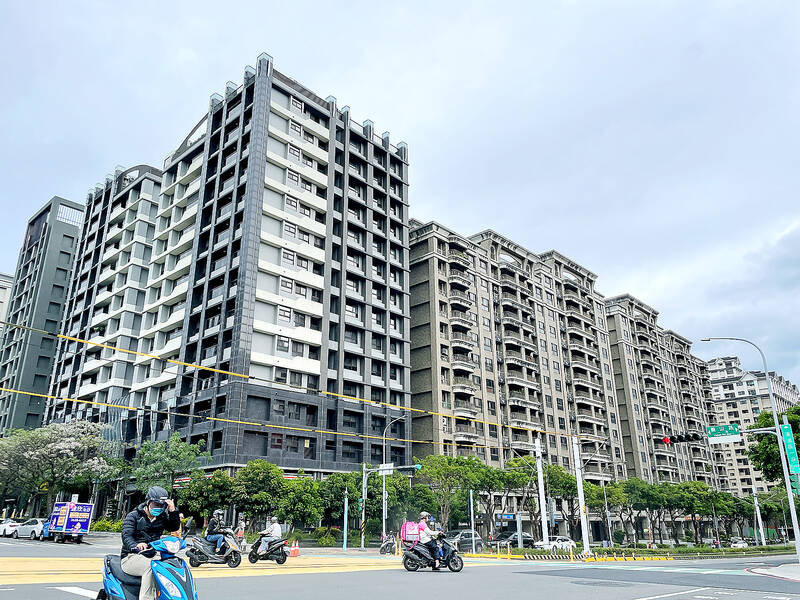The climate monitor for presale and newly completed homes last month remained “green” in the north for the 13th consecutive month, but showed signs of slowdown as developers postponed projects, the Chinese-language My Housing Monthly said on Thursday.
The confidence reading printed 45.7, shedding 6.1 points from July as developers and builders put off projects for Ghost Month, which this year was from July 29 to Aug. 26 and is typically an unfavorable period for doing business, the property research publication said.
The score was the lowest this year, but the gauge remained in a steady growth zone, it said.

Photo: Hsu Yi-ping, Taipei Times
“Economic uncertainty and interest rate hikes are weakening sentiment, but the supply side refuses to lower prices,” My Housing Monthly research manager Ho Shih-chang (何世昌) said.
However, developers postponed launching new projects to ease selling pressures, Ho said.
The approach appeared to be working, but might not be sustainable if developers return to active promotion in the upcoming season starting on Sept. 28 and sales disappoint, the analyst said.
New presale projects last month were expected to generate NT$70 billion (US$2.28 billion) of total revenue with two projects valued at more than NT$1.5 billion in Taipei’s Beitou (北投) and Wanhua (萬華) districts, and eight in New Taipei City’s Sanchong (三重), Linkou (林口), Tamsui (淡水) and Taishan (泰山) districts, the report said.
My Housing Monthly defines projects of more than NT$1.5 billion as major in scale. Only six projects met that criterion in Taoyuan and Hsinchu City, and none in Keelung or Yilan County.
Sales rates shrank from 2.6 deals to 2.2 deals per week last month, while reception sites met with 22 groups of potential buyers per week, down from 28 in July, it said, adding that interest was sluggish Keelung and Yilan.
Newly completed homes amounted to 400 apartment units with only one complex in Keelung valued at more than NT$1.5 billion, it said.
However, concession rates fell 0.27 percentage points to 10.49 percent, as developers showed no intention of conceding to facilitate transactions, Ho said, adding that the inflexible stance was due to the absence of selling pressure.
Rather, developers are seeking to find buyers online, with the number of projects for sale online rising to 1,024 projects, Ho said.

CHIP RACE: Three years of overbroad export controls drove foreign competitors to pursue their own AI chips, and ‘cost US taxpayers billions of dollars,’ Nvidia said China has figured out the US strategy for allowing it to buy Nvidia Corp’s H200s and is rejecting the artificial intelligence (AI) chip in favor of domestically developed semiconductors, White House AI adviser David Sacks said, citing news reports. US President Donald Trump on Monday said that he would allow shipments of Nvidia’s H200 chips to China, part of an administration effort backed by Sacks to challenge Chinese tech champions such as Huawei Technologies Co (華為) by bringing US competition to their home market. On Friday, Sacks signaled that he was uncertain about whether that approach would work. “They’re rejecting our chips,” Sacks

Taiwan’s exports soared 56 percent year-on-year to an all-time high of US$64.05 billion last month, propelled by surging global demand for artificial intelligence (AI), high-performance computing and cloud service infrastructure, the Ministry of Finance said yesterday. Department of Statistics Director-General Beatrice Tsai (蔡美娜) called the figure an unexpected upside surprise, citing a wave of technology orders from overseas customers alongside the usual year-end shopping season for technology products. Growth is likely to remain strong this month, she said, projecting a 40 percent to 45 percent expansion on an annual basis. The outperformance could prompt the Directorate-General of Budget, Accounting and

NATIONAL SECURITY: Intel’s testing of ACM tools despite US government control ‘highlights egregious gaps in US technology protection policies,’ a former official said Chipmaker Intel Corp has tested chipmaking tools this year from a toolmaker with deep roots in China and two overseas units that were targeted by US sanctions, according to two sources with direct knowledge of the matter. Intel, which fended off calls for its CEO’s resignation from US President Donald Trump in August over his alleged ties to China, got the tools from ACM Research Inc, a Fremont, California-based producer of chipmaking equipment. Two of ACM’s units, based in Shanghai and South Korea, were among a number of firms barred last year from receiving US technology over claims they have

BARRIERS: Gudeng’s chairman said it was unlikely that the US could replicate Taiwan’s science parks in Arizona, given its strict immigration policies and cultural differences Gudeng Precision Industrial Co (家登), which supplies wafer pods to the world’s major semiconductor firms, yesterday said it is in no rush to set up production in the US due to high costs. The company supplies its customers through a warehouse in Arizona jointly operated by TSS Holdings Ltd (德鑫控股), a joint holding of Gudeng and 17 Taiwanese firms in the semiconductor supply chain, including specialty plastic compounds producer Nytex Composites Co (耐特) and automated material handling system supplier Symtek Automation Asia Co (迅得). While the company has long been exploring the feasibility of setting up production in the US to address